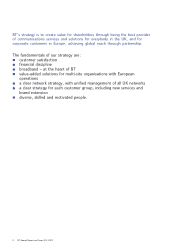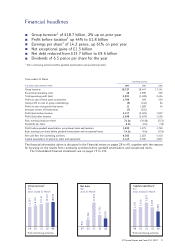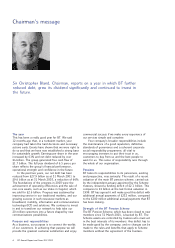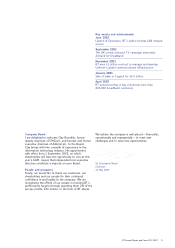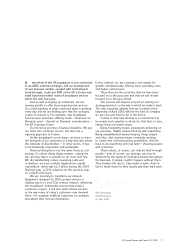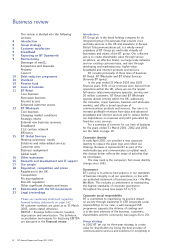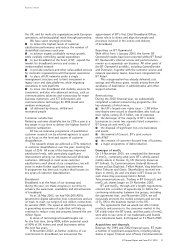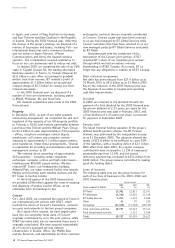BT 2003 Annual Report Download - page 12
Download and view the complete annual report
Please find page 12 of the 2003 BT annual report below. You can navigate through the pages in the report by either clicking on the pages listed below, or by using the keyword search tool below to find specific information within the annual report.
Business review
BT Annual Report and Form 20-F 2003 11
BT Retail
Years ended, or as at,
31 March 2003 2002 2001
Group turnover £13,301m £12,811m £12,541m
No. of employees (’000) 50.4 51.2 54.1
BT Retail is the UK’s largest communications service
provider, by market share, to the residential and
business markets. It trades under one of the UK’s
leading brands – BT – and is the prime channel to
market in the UK for other businesses in the BT group.
It supplies a wide range of communication products
and services, including voice, data, internet and
multimedia services, and offers a comprehensive range
of managed and packaged communications solutions.
Its strategy is to improve the customer experience,
control costs and increase cashflow, defend core
revenues and build new revenue streams.
The core portfolio covers traditional telephony
products such as calls, analogue/digital lines and
private circuits. New revenue generation is focused
on broadband, mobility and ICT.
BT Retail has three main customer groups:
consumer (residential customers), major business
(corporate customers and the public sector) and
business (usually companies of up to 500 employees).
It has approximately 19 million consumer customers
and over one million business customers, including
major business customers.
Core business
As at 31 March 2003, BT Retail had more than
29 million customer lines (exchange line connections),
nine million of which were business lines and lines for
other service providers, and the remainder of which
were for residential customers.
Fixed-network call revenues, including rental and
connection charges, accounted for approximately 29%
of our revenues in the 2003 financial year. The number
of business lines remained stable, although high-speed
ISDN services grew by over 6%.
In the residential fixed-voice call market, BT
Retail’s share remained stable over the year at around
73%, as it has been since June 2000. The number of
residential voice lines grew by 0.2%. Our market share
of the business fixed voice sector for the 2003 financial
year was 45%, compared with 49% for the 2002
financial year.
Consumer
Our residential business saw revenue growth, for
the first time for a number of years, driven by stable
market share, stable customer numbers and growth
in national calls.
&During the 2003 financial year, the BT Together
pricing packages, which offer a range of competitive call
prices and fixed-fee pricing options, continued to win
customers. As at 31 March 2003, ten million customers
had signed up for BT Together, accounting for 70% of
residential customer call minutes. In April 2003, we
announced that BT Together would be streamlined with
effect from 1 June 2003, per-minute charging for
evening and weekend calls would be removed and the
distinction between local and national calls abolished,
in favour of a single UK rate.
&During the 2003 financial year, we reduced the
costs of our payphones operation through removal of
over 18,000 payphones from sites where there is a
suitable alternative. We remain committed to retaining
payphones in locations, such as rural communities,
where there is no suitable alternative.
&The launch in December 2002 of our new
directories operation provides customers with a
one-stop directory enquiries and information service
on a single number – 118 500. In addition to the
number service, our acquisition in August 2002 of the
business of Scoot.com, the business finder directory
service, enables customers to access classified listings
and other enhanced information services.
Major business
&BT Retail helps its major business customers to
manage their communications spend, using a free
PC-based tool to analyse customer bills – BT Billing
Analyst. This assists in pinpointing areas of inefficiency,
identifying unnecessary calls at premium or peak rates
and combating fraud. A consulting service is being
introduced which uses this information to construct
more efficient customer networks.
&The deregulation of inbound 0800 numbers means
that we can offer bespoke pricing to our largest call
centre customers.
Business
In the business market, our strategy is to provide
business customers with a simpler and tailored service,
thereby creating greater certainty and predictability in
their business. We continue to defend and acquire
telephony contracts through our BT Business Plan and
BT Commitment portfolio against the carrier pre-select
and wholesale line rental services.
&Between October 2002 and March 2003, the
number of business customers on the BT Commitment
Reward discount package doubled to over 60,000.
&In January 2003, BT became the first UK
telecommunications company to cap the cost of
business calls by launching BT Business Plan which sets
a ceiling of 10 pence on local and national calls –
provided only that they last less than an hour. At the
end of March 2003, BT Business Plan had attracted
over 20,000 business customers. Over the same
period, the awareness of the plan among business
customers reached 33.5%.
New-wave business
In total, BT Retail grew new-wave revenues from
£582 million in the 2002 financial year to £850 million
in the 2003 financial year, a 46% increase.
Consumer
&The launch during the year of BT Broadband is
key to our approach to helping build the broadband
market in the UK. For £27 per month, BT Broadband
customers get instant connection to the internet,
unlimited access with no time restrictions, the
opportunity to use the phone and surf at the same



